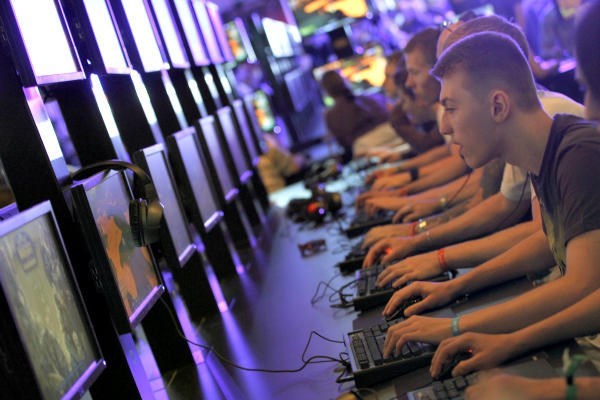 |
| Visitors play World of Warcraft during the Gamescom 2011 fair in Cologne, Germany. By the time average Americans turn 21, they have played 10,000 hours of video games. Games for Change advocates using some of that time on games that result in social good.
Ina Fassbender/Reuters/File |
From world hunger to peace to economic development, a new tool is making a difference: video games.
By the time average Americans turn 21, they have played 10,000 hours of video games. That is equal to the amount of time they will spend in school in the United States between 5th and 12th grade or it is equal to five years in a full time job. According to Malcolm Gladwell's book, Outliers, a person who spends 10,000 hours on any activity "masters" it.
Take World of Warcraft, a hugely popular interactive virtual reality game with 10.3 million players around the world. It's not your '90s Mario Brothers with 10 controls. Warcraft is so complex that the online wiki encyclopedia about the game – characters, history, events – -has 96,890 pages, making it one of the largest wikis in the world. Mastering Warcraft means internalizing vast amounts of the information in that wiki.
World of Warcraft is not saving the world. But focusing on the positive uses of video games could turn gamers into global heroes.
The education potential of games is huge, in part because so many people are already playing them. Globally, we spend 3 billion hours playing video games. There are few activities that over a fifth of the population do that can be used to create change. If we harnessed that time and energy for really tough global problems, we just might be able to solve them.
Using games for social benefit, or "games for change," is a fast-growing movement led by an organization founded in 2004 under the same name. Games for Change's mission is to "catalyze social impact through digital games."
Using games for positive social change has evolved just as gaming itself has evolved. As more people became aware of the popularity of games, they began to spread. First came simple educational games: The Oregon Trail and Reader Rabbit were popular in the United States in the '90s.
The United Nations saw the value of games and was an early pioneer in figuring out how to use them to create positive social change--and putting funding behind it.
Jane McGonigal, a key proponent of the movement, gave a popular TED talk in 2010, further pushing the concept of gaming for change forward.
"Games are really good for exploring complex issues in society," continued Games for Change spokesperson Suzanne Seggerman in an interview on ABC News in 2011.
Social change games have been branching to all fields and all styles. Foldit is a game designed to discover protein structures that will solve genetic problems and diseases. Each player gets to fold proteins and the game determines if that protein solves a medical problem. Busy-work that would take someone a lifetime to do alone is spread among thousands of players in order to help teach human puzzle-solving strategies to computers. Researchers had been working for over a decade on discovering an AIDS protein that may lead to a cure. Earlier this year, the gamers solved the protein puzzle within 10 days.
The number of these games has been growing, and as these games become more established, the success of their objectives is becoming more apparent.
For organizations with messages or agendas, games are a fun way for people to get involved. Technology is spreading from laptops to tablets to mobile phones. Seventy-five percent of the world's population has access to mobile phones, making the possibility of scaling games for change incredible.
Games that create positive change is a way for companies that produce games to reach an entirely new market segment. At the same time, gaming audiences welcome the chance to reverse the stereotype of "gamers."
For game developers, it's also a new market: helping nonprofits with social missions reach a new, engaged audiences. For the first time next year, the Games for Change organization will get an entire day at the annual Game Developers Conference to help more developers get involved.
The opportunities for charitable organizations are increasing every day, and as groups like Games for Change have conferences of their own, recruiting developers to create the games is getting easier.
Soon, a favorite pastime may actually do a lot of good.
Page created on 10/19/2012 12:00:00 AM
Last edited 1/5/2017 4:26:41 PM
